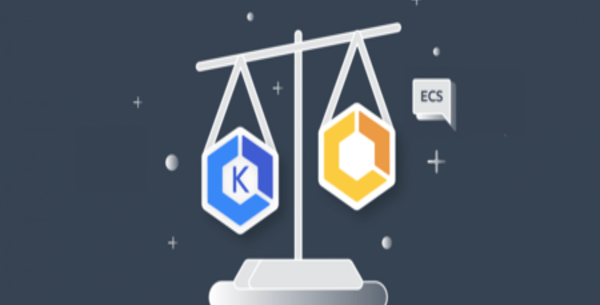
The Comparison of AWS ECS vs Kubernetes

Samira Kabbour
CMO
Table of Contents
Before comparing AWS ECS vs Kubernetes, let’s get back to containers.
Containers have rapidly increased in popularity by making it easy to develop, promote and deploy code consistently across different environments. Containers are an abstraction at the application layer, wrapping up your code with necessary libraries, dependencies, and environment settings into a single executable package.
Containers are intended to simplify the deployment of code, but managing thousands of them is no simple task. When it comes to creating highly available deployments, scaling up and down according to load, checking container health and replacing unhealthy containers with new ones, exposing ports and load balancing — another tool is needed. This is where container orchestration comes in.
Containers and microservices go hand in hand, significantly increasing the volume of individual services running in a typical environment compared to the number of monoliths running in a traditional environment. With this added complexity, container orchestration is a must for any realistic deployment at scale.
Aside from orchestration issues, another issue remains to be solved — where and how can containers be run? Additional tools are needed to run a cluster and manage cluster infrastructure. Fortunately, we have a few choices to fill this need.
Docker has become the defacto standard for creating containers. For orchestration and cluster management ECS vs Kubernetes are two popular choices, each with their own pros and cons.
-
AWS Elastic Container Service (ECS)
One solution is to offload the work of cluster management to AWS through the use of Amazon’s Elastic Container Service (ECS). ECS is a good solution for organizations who are already familiar with Amazon Web Services. A cluster can be configured and deployed with just a few clicks, backed by EC2 instances you manage or by Fargate, a fully managed cluster service.
Pros: Terminology and underlying compute resources will be familiar to existing AWS users. Fast and easy to get started, easily scaled up and down to meet demand. Integrates well with other AWS services. One of the simplest ways to deploy highly available containers at scale for production workloads.
Cons: Proprietary solution. Vendor lock-in: containers are easily moved to other platforms, but configuration is specific to ECS. No access to cluster nodes in Fargate makes troubleshooting difficult. Not customizable and doesn’t work well for non-standard deployments.
Bottom Line: Fast and easy to use, especially for existing AWS users. Great option for small teams who don’t want to maintain their own cluster. But vendor lock-in and the inability to customize or extend the solution may be an issue for larger enterprises.
-
Kubernetes
For advanced users, Kubernetes offers the most robust toolset for managing both clusters and the workloads run on them. One of the most popular open-source projects on GitHub and backed by Google, Microsoft, and others, Kubernetes is the most popular solution for deploying containers in production. The platform is well-documented and extensible, allowing organizations to customize it to fit their needs. Although it is fairly complex to set up, many managed solutions are available including EKS from AWS, GKE from GCP, AKS from Azure, PKS from Pivotal and now even Docker offers their own hosted Kubernetes Service.
Pros: The most popular and widely adopted tool in the space for large enterprise deployments. Backed by a large open-source community and big tech companies. Flexible and extensible to work in any environment.
Cons: Complex to learn, difficult to set up, configure and maintain. Lacks compatibility with Docker Swarm and Compose CLI and manifests.
Bottom Line: For true enterprise-level cluster and container management, nothing beats Kubernetes. Although complex, ultimately that complexity translates into additional features that prove extremely valuable as your containerized workload begins to scale. As cloud vendors race to simplify things with managed k8s offerings, it will only get easier to deploy and maintain a cluster in Kubernetes.
Docker // Kubernetes // AWS // Cloud Computing
Source: medium.com (adapted)
Author Madhu Dm, an AWS Cloud Developer



